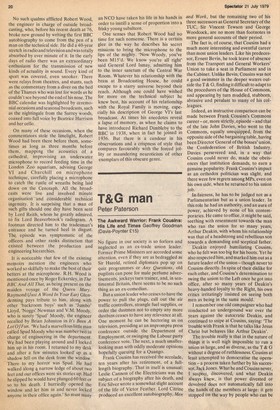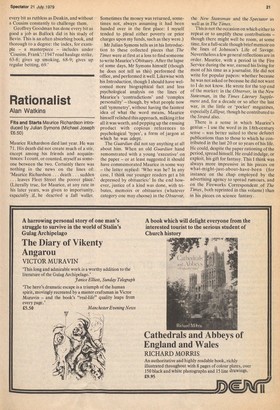T&G man
Peter Paterson
The Awkward Warrior: Frank Cousins: His Life and Times Geoffrey Goodman (Davis-Poynter £15) No figure in our society is so forlorn and neglected as an ex-trade union leader. Former Prime Ministers are accorded some attention, even if they are as bedraggled as Sir Harold, retired diplomats pop up on quiz programmes or Any Questions, old pugilists can pose for male perfume advertisements, jockeys turn trainer, and, in sentimental Britain, there seems to be no such thing as an ex-comedian. But a union leader who ceases to have the power to pull the plugs, call out the air traffic controllers, strangle fuel supplies, or order the dustmen not to empty any more dustbins ceases to have any relevance at all. One moment he can be hectoring us on television, presiding at an impromptu press conference outside the Department of Employment, or swinging the Labour party conference vote. The next, a much smallerlooking man with oddly moderate opinions hopefully queuing for a Quango. Frank Cousins has received the accolade, ten years after his retirement, of a fulllength biography. That in itself is unusual: Leslie Cannon of the Electricians was the subject of a biography after his death, and Eric Silver wrote a somewhat slight account of the life of Victor Feather. Lord Citrine produced an excellent autobiography, Men and Work, but the remaining two of his three successors as General Secretary of the TUC, Sir Vincent Tewson and George Woodcock, are no more than footnotes in more general accounts of their period.
The fact is, of course, that Cousins had a much more interesting and eventful career than most union leaders. Like his predeces sor, Ernest Bevin, he took leave of absence from the Transport and General Workers' Union to take a seat in Parliament and in the Cabinet. Unlike Bevin, Cousins was not a good swimmer in the deeper waters out side the T & G, finding it difficult to adapt to the procedures of the House of Commons, and appearing by turn muddled, stubborn, abrasive and petulant to many of his colleagues.
Indeed, an instructive comparison can be made between Frank Cousins's Commons career— or, more strictly, episode —and that of the late John Davies, who went to the Commons, equally unequipped, from the opposite side of the bargaining table, having been Director General of the bosses' union, the Confederation of British Industry. Davies persevered and, in a way that Cousins could never do, made the obeisences that institution demands, to earn a genuine popularity. Frank Cousins's impact as an orthodox politician was slight, and there were few regrets among MPs, even on his own side, when he returned to his union job.
In-fairness, he has to be judged not as a Parliamentarian but as a union leader. In this role he had an authority, and an aura of power, achieved by none of his contemporaries. He came to office, it might be said, seething with resentment towards the man who ran the union for so many years, Arthur Deakin, with whom his relationship was that of a headstrong and rebellious son towards a demanding and sceptical father.
Deakin enjoyed humiliating Cousins, who he felt was too big for his boots. Yet he also respected him, and marked him out as a future leader of the union—though never to Cousins directly. In spite of their dislike for each other, and Cousins's determination to swing the union to the Left once he got into office, after so many years of Deakin's heavy-handed loyalty to the Right, his own critics irritatingly insisted on seeing both men as being in the same mould.
I remember one old campaigner who had conducted an underground war over the years against the autocratic Deakin, and continued to snipe at Cousins, saying: The trouble with Frank is that he talks like Jesus Christ but behaves like Arthur Deakin'.
The trouble really is that in the nature of things it is well nigh impossible to run a union as large, and as diverse, as the T & G without a degree of ruthlessness. Cousins at least attempted to democratise the operation — a process taken further by his successor, Jack Jones. What he and Cousins never, I suspect, discovered, arid what Deakin always knew,, is that power divested or devolved does not automatically fall into the hands of the members at large: it gets stopped on the way by people who can be every bit as ruthless as Deakin, and without a Cousins constantly to challenge them.
Geoffrey Goodman has done every bit as good a job as Bullock did in his study of Bevin. This is an often absorbing book, and thorough to a degree: the index, for example — a masterpiece — includes under 'Cousins, Frank': 1947 road haulage strike, 63-8; gives up smoking, 68-9; gives up regular betting, 69.'



































 Previous page
Previous page